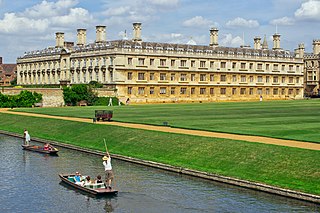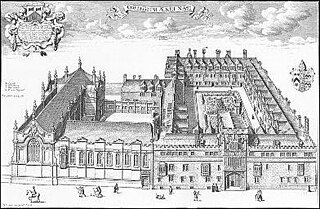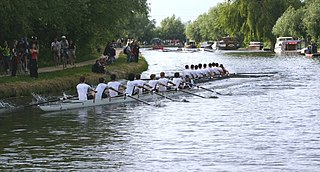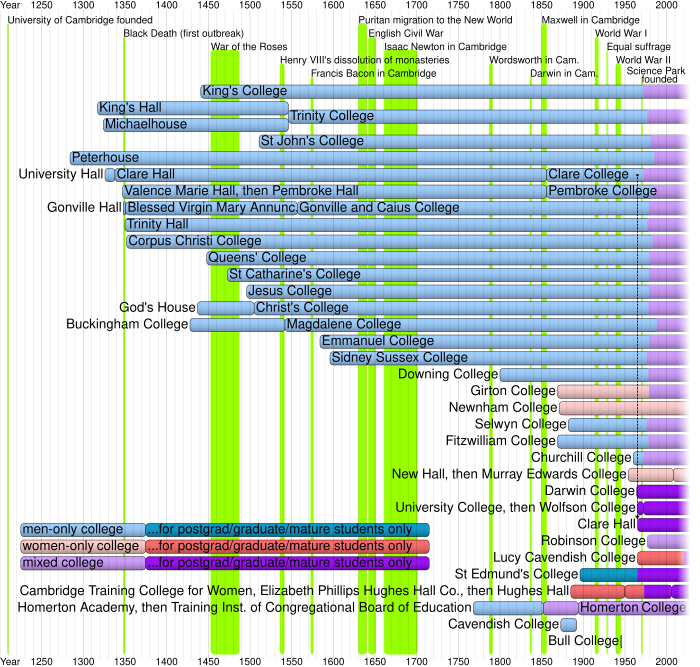
Clare College is a constituent college of the University of Cambridge in Cambridge, England. The college was founded in 1326 as University Hall, making it the second-oldest surviving college of the University after Peterhouse. It was refounded in 1338 as Clare Hall by an endowment from Elizabeth de Clare, and took on its current name in 1856. Clare is famous for its chapel choir and for its gardens on "The Backs".

Hughes Hall is a constituent college of the University of Cambridge in England. It is the oldest of the University of Cambridge's postgraduate colleges. The college also admits undergraduates, though undergraduates admitted by the college must be aged 21 or over. There is no age requirement for postgraduate students. The majority of Hughes Hall students are postgraduate, although nearly one-fifth of the student population comprises individuals aged 21 and above who are studying undergraduate degree courses at the university.

The University of Oxford has thirty-nine colleges, and four permanent private halls (PPHs) of religious foundation. Colleges and PPHs are autonomous self-governing corporations within the university. These colleges are not only houses of residence, but have substantial responsibility for teaching undergraduate students. Generally tutorials and classes are the responsibility of colleges, while lectures, examinations, laboratories, and the central library are run by the university. Students normally have most of their tutorials in their own college, but often have a couple of modules taught at other colleges or even at faculties and departments. Most colleges take both graduates and undergraduates, but several are for graduates only.

Cambridge Students' Union, known as Cambridge SU, is the university-wide representative body for students at the University of Cambridge, England. Its predecessor union was known as Cambridge University Students' Union or CUSU until its dissolution in July 2020.

Murray Edwards College is a women-only constituent college of the University of Cambridge. It was founded in 1954 as New Hall and renamed in 2008. The name honours a gift of £30 million by alumna Ros Edwards and her husband Steve, and the first President and woman Vice-Chancellor of the University of Cambridge, Rosemary Murray.

Newnham College is a women's constituent college of the University of Cambridge.

Homerton College is a constituent college of the University of Cambridge. Its first premises were acquired in Homerton, London in 1768, by an informal gathering of Protestant dissenters with origins in the seventeenth century. In 1894, the college moved from Homerton High Street, Hackney, London, to Cambridge. Homerton was admitted as an "Approved Society" of the university in 1976, and received its Royal charter in 2010, affirming its status as a full college of the university. The college celebrated its 250th anniversary in 2018.

Darwin College is a constituent college of the University of Cambridge. Founded on 28 July 1964, Darwin was Cambridge University's first graduate-only college, and also the first to admit both men and women. The college is named after one of the university's most famous families and alumni, that of Charles Darwin. The Darwin family previously owned some of the land, Newnham Grange, on which the college now stands.

Clare Hall is a constituent college of the University of Cambridge. Founded in 1966 by Clare College, Clare Hall is a college for advanced study, admitting only postgraduate students alongside postdoctoral researchers and fellows. It was established to serve as an Institute of Advanced Studies and has slowly grown and developed into a full constituent college.

The Senate House is a 1720s building of the University of Cambridge in England, used formerly for meetings of its senate and now mainly for graduation ceremonies.

A May Ball is a ball at the end of the academic year that takes place at any of the colleges of the University of Cambridge. They are elaborate and lavish formal affairs, requiring black tie or sometimes white tie, with ticket prices ranging from around £100 to as much as £640 for a pair of dining tickets at Trinity. May Ball budgets can exceed £200,000; a report by the student newspaper Varsity in 2016 found that the budget for the 2015 Trinity ball was £286,000. The balls are held in the colleges, starting around from 6-9 p.m. and lasting until well after dawn. "Survivors photographs" are taken of those who last until morning. Other colleges frequently hold winter balls, such as the popular Selwyn Snowball, who recently had acts such Tinchy Stryder and Mumford and Sons headlining.
The Cambridge University Association Football League (CUAFL) is a football league between the Colleges of Cambridge University organised by the Cambridge University Association Football Club.

Cambridge Judge Business School is the business school of the University of Cambridge. The School is a provider of management education. It is named after Sir Paul Judge, a founding benefactor of the school. The School is a department of the university's School of Technology administrative group.

The May Bumps are a set of rowing races, held annually on the River Cam in Cambridge, England. They began in 1887 after separating from the Lent Bumps, the equivalent bumping races held at the end of February or start of March. Prior to the separation there had been a single set of annual bumps dating from its inception in 1827. The races are open to all college boat clubs from the University of Cambridge, the University Medical and Veterinary Schools and the Anglia Ruskin Boat Club. The May Bumps takes place over four days in mid-June and is run as a bumps race.

Gonville and Caius College, often referred to simply as Caius, is a constituent college of the University of Cambridge in Cambridge, England. Founded in 1348 by Edmund Gonville, it is the fourth-oldest of the University of Cambridge's 31 colleges and one of the wealthiest. In 1557, it was refounded by alumnus John Caius. The college has been attended by many students who have gone on to significant accomplishment, including fifteen Nobel Prize winners, the second highest of any Oxbridge college.

The University of Cambridge is a public collegiate research university in Cambridge, England. Founded in 1209, the University of Cambridge is the world's third-oldest university in continuous operation. The university's founding followed the arrival of scholars who left the University of Oxford for Cambridge after a dispute with local townspeople. The two ancient English universities, although sometimes described as rivals, share many common features and are often jointly referred to as Oxbridge.

The following is a timeline of the history of the city of Cambridge, England.
The May Bumps 2021 were a set of rowing races at Cambridge University scheduled to take place from Wednesday 16 June 2021 to Saturday 19 June 2021. The event was to be run as a bumps race and would have been the 129th set of races in the series of May Bumps which had been held annually in mid-June since 1887. In this edition of the Mays, the women's divisions were due to be raced before the equivalent men's divisions.


















